Share

Digital HR Leaders with David Green
How Cardinal Health Transformed Their People Analytics Function (an Interview with Erin Gerbec)
HR practices are rapidly evolving. To support these practices, the creation of a new operating model for people analytics is essential.
In this episode of the Digital HR Leaders podcast, host David Green sits down with Erin Gerbec, Director of People Analytics at Cardinal Health. Erin is a visionary leader who has successfully redefined the operating model for her people analytics team, transforming it into a high-functioning, consultative unit that aligns closely with business goals.
In listening to this episode, listeners can look forward to learning more about:
- Erin’s insights on the challenges and strategies involved in creating a new operating model for people analytics
- A detailed look at the steps taken to standardise reporting across the HR function, enabling a shift towards a more consultative approach
- The impact of this shift on the way the people analytics team interacts with HR partners and the broader business
- Key initiatives for training and upskilling that supported the transition to a new operating model
- The technological advancements that facilitated the transformation and enhanced the customer experience
- Practical advice on understanding customer needs through building personas and the benefits of collaborating with other business units
For HR leaders looking to innovate and drive strategic value through people analytics, this episode offers invaluable insights and actionable strategies.
Support for this podcast comes from Crunchr, a platform that integrates an HR data lake with state-of-the-art people analytics. Whether you're an advanced user or just starting out, Crunchr's generative AI co-pilot helps you unlock insights with ease. You can learn more by visiting www.crunchr.com
More episodes
View all episodes
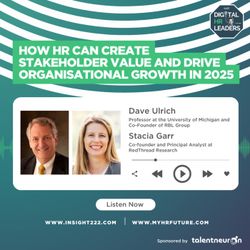
216. How HR Can Create Stakeholder Value and Drive Organisational Growth in 2025 (an Interview with Stacia Garr and Dave Ulrich)
51:13||Season 44, Ep. 2162025 is officially here, and to set the tone for the year ahead, host David Green is joined by two of the most respected thought leaders in HR: Stacia Garr, cofounder and principal analyst at RedThread Research, and Dave Ulrich, the ‘father of modern HR’ and cofounder of The RBL Group. Drawing on David’s annual “12 Opportunities for HR in 2025” published on LinkedIn, this episode dives deeper into the critical pivots Chief People Officers need to make to amplify HR’s impact and deliver greater value to both the organisation and its workforce. From navigating uncertain geopolitics and economic shifts to unlocking the transformative potential of AI, David, Stacia and Dave share candid insights on the most pressing issues facing HR in 2025. Listen as they explore: The key drivers and challenges shaping HR’s agenda in 2025 How to proactively craft growth strategies amidst ongoing uncertainty Practical steps for creating stakeholder value through human capability Evolving DEI efforts to remain impactful, even as organisational priorities shift The game-changing power of agentic AI for HR, from enhancing business value to reimagining how HR works Rethinking organisational design and talent strategies to stay ahead in a rapidly transforming world of work If you’re eager to learn how forward-thinking HR leaders are preparing for success in 2025—and want to hear proven tips for igniting meaningful change—this episode, sponsored by TalentNeuron, is one you won’t want to miss. From strategic workforce planning to skill gap analysis, TalentNeuron combines external talent intelligence and internal data into one seamless platform. Want to learn more? Visit talentneuron.com today.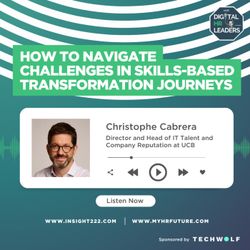
215. How to Navigate Challenges in Skills-Based Transformation Journeys (an Interview with Christophe Cabrera)
44:58||Season 43, Ep. 215Taking the first steps towards becoming a skills-based organisation is exciting—but what does it really take to get started? In this episode of the Digital HR Leaders Podcast, David Green sits down with Christophe Cabrera, Director and Head of IT Talent and Company Reputation at UCB, to share an honest look at the early days of their transformation. Unlike the polished success stories we often hear, this conversation is all about the reality of starting out: what works, what doesn’t, and how to build momentum. Here’s what you can expect: The biggest challenges in getting started, from outdated approaches to experimenting with AI How UCB used proof-of-concept to build confidence in AI-powered solutions Managing the complexities of a workforce spread across production, clinical and office roles Keeping their skills framework agile as new competencies emerge Defining what success looks like, with internal mobility and personalised learning leading the way This conversation, sponsored by TechWolf, is an honest and practical look at what it takes to get started with skills-based management. TechWolf is an AI-powered solution focused on one mission: delivering reliable skills data for every role and every employee in your organisation. With TechWolf, companies like HSBC, GSK, IQVIA, Workday, and United Airlines have accelerated time-to-hire by 32%, boosted internal mobility by 42%, and saved around $1,000 per employee annually on talent management. Visit techwolf.com for more information. Links to Resources: Christophe Cabrera: LinkedIn MyHRFuture Academy: MyHRFuture Insight222: Insight222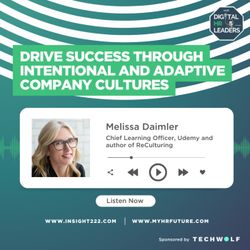
214. Drive Success through Intentional and Adaptive Company Cultures (an Interview with Melissa Daimler)
40:42||Season 43, Ep. 214How can HR leaders design company cultures that are intentional, adaptive and aligned with business goals? To answer this question, in this episode of the Digital HR Leaders podcast, David Green sits down with Melissa Daimler, Chief Learning Officer at Udemy and author of ReCulturing: Design Your Company Culture to Connect with Strategy and Purpose for Lasting Success. With years of hands-on experience at Adobe, Twitter, WeWork, and now Udemy, Melissa brings a wealth of practical insights on how to build cultures that stand the test of change. Here’s what you can expect from this conversation: How trends like skills-based strategies, AI and flexible working are reshaping workplace culture What a healthy culture really looks like—and how to build it intentionally How Udemy is aligning its culture with skills-focused goals and preparing for AI’s growing impact Tips for staying clear and aligned as priorities shift rapidly Common missteps organisations make when trying to design culture—and how to avoid them This episode, sponsored by TechWolf, is packed with real-world advice and insights that HR and learning leaders can start applying right away. TechWolf is an AI-powered solution focused on one mission: delivering reliable skills data for every role and every employee in your organisation. With TechWolf, companies like HSBC, GSK, IQVIA, Workday, and United Airlines have accelerated time-to-hire by 32%, boosted internal mobility by 42%, and saved around $1,000 per employee annually on talent management. Visit techwolf.com for more information. Links to Resources: Melissa Daimler: LinkedIn MyHRFuture Academy: MyHRFuture Insight222: Insight222 TechWolf: TechWolf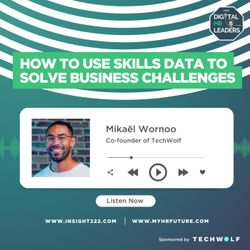
213. How to Use Skills Data to Solve Business Challenges (an Interview with Mikaël Wornoo)
37:24||Season 43, Ep. 213What better way to learn about the makes or breaks of skills initiatives than from an organisation whose mission is to deliver reliable skills data across the workforce? Joined by Mikaël Wornoo, co-founder of TechWolf, host David Green explores how organisations can move beyond surface-level skills discussions to drive real business impact. Sharing lessons learned from working with global organisations, this episode covers: How organisations are innovatively applying skills data to solve business challenges Contrasts between US and European approaches to skills that could shape your global workforce strategy The hidden challenges that derail skills projects and what companies often miss when trying to “get started” The roles required to build a truly effective skills team Why AI isn’t just the future of skills intelligence but the catalyst for shifting how organisations define and measure talent This episode, sponsored by TechWolf, isn’t about skills for the sake of skills—it’s about reframing workforce intelligence as a strategic lever for measurable business outcomes. TechWolf is an AI-powered solution focused on one mission: delivering reliable skills data for every role and every employee in your organisation. With TechWolf, companies like HSBC, GSK, IQVIA, Workday, and United Airlines have accelerated time-to-hire by 32%, boosted internal mobility by 42%, and saved around $1,000 per employee annually on talent management. Visit techwolf.com for more information. Links to Resources: TechWolf: TechWolf MyHRFuture Academy: MyHRFuture Insight222: Insight222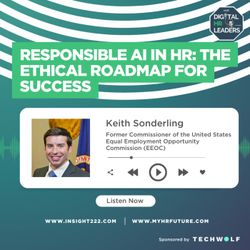
212. Responsible AI in HR: The Ethical Roadmap for Success (an Interview with Keith Sonderling)
52:40||Season 43, Ep. 212In a world where artificial intelligence and workplace technologies are revolutionising how we work, the stakes have never been higher. How can organisations harness these powerful tools while ensuring fairness, ethics and compliance in a rapidly changing landscape? In this episode of the Digital HR Leaders podcast, host David Green sits down with Keith Sonderling, former Commissioner of the United States Equal Employment Opportunity Commission (EEOC), to tackle these critical questions. With a front-row seat to the challenges and opportunities at the intersection of AI and employment law, together, David and Keith explore: The promises of AI in HR—and the hidden risks leaders need to watch for How the global regulatory landscape is shaping the use of AI in the workplace Who’s accountable when AI gets it wrong—and how liability is determined What HR tech vendors and HR leaders must do now to stay ahead of evolving regulations Real-world advice for embracing innovation without compromising on ethics or compliance Whether you’re an HR leader navigating the rise of AI, a tech innovator shaping the future of work, or someone passionate about building a fairer workplace, this episode, sponsored by TechWolf is a must-listen. TechWolf is an AI-powered solution focused on one mission: delivering reliable skills data for every role and every employee in your organisation. With TechWolf, companies like HSBC, GSK, IQVIA, Workday, and United Airlines have accelerated time-to-hire by 32%, boosted internal mobility by 42%, and saved around $1,000 per employee annually on talent management. Visit techwolf.com for more information. Links to Resources: Keith Sonderling: Keith Sonderling TechWolf: TechWolf MyHRFuture Academy: MyHRFuture Insight222: Insight222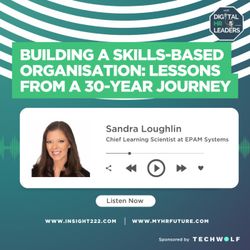
211. Building a Skills-Based Organisation: Lessons from a 30-Year Journey (an Interview with Sandra Loughlin)
38:46||Season 43, Ep. 211What can we learn from an organisation that has been a skills-based pioneer for over 30 years? At EPAM Systems, building a future-ready, skills-based workforce has been a foundational strategy, positioning the company as one of the most mature examples in the field. In this episode of the Digital HR Leaders podcast, host David Green is joined by Sandra Loughlin, Chief Learning Scientist at EPAM Systems, to discuss the lessons EPAM has learned over its decades-long journey and how organisations can apply these insights to their own skills transformations. Together, they dive into: The structure and strategy behind EPAM’s skills-based evolution, shaped by 30 years of experience in skills management Common myths around skills-based organisations The importance of defining the work itself before pinpointing necessary skills Practical guidance on selecting the right technology to support skills-based practices Approaches to validating skills data, moving beyond self or manager assessments to more reliable data sources Insights on tailoring a skills strategy to different industries and functions, and determining when high-quality skills data is a must This episode, sponsored by TechWolf, is essential for HR leaders seeking to drive business impact through robust skills data and build a truly future-ready workforce. TechWolf is an AI-powered solution focused on one mission: delivering reliable skills data for every role and every employee in your organisation. With TechWolf, companies like HSBC, GSK, IQVIA, Workday, and United Airlines have accelerated time-to-hire by 32%, boosted internal mobility by 42%, and saved around $1,000 per employee annually on talent management. Visit techwolf.com for more information. Links to Resources: Sandra Loughlin: Sandra Loughlin TechWolf: TechWolf MyHRFuture Academy: MyHRFuture Insight222: Insight222
210. How Digital Transformation Fuels Skills and Ex at Lloyds Banking Group (an Interview with Lara Wainwright & Duncan Reynall)
42:27||Season 42, Ep. 210As digital transformation redefines industries, organisations are faced with the challenge of building a workforce equipped for rapid change. At Lloyds Banking Group, this shift is driving a bold move towards a skills-based organisation, where agility, adaptability, and continuous learning are core to its evolution. In this episode of the Digital HR Leaders podcast, host David Green is joined by two leaders at the heart of this transformation: Lara Wainwright, Product Owner and Lab Lead, and Duncan Reynall, Group Talent & Development Director at Lloyds Banking Group. Together, they dive into: The broader strategy behind Lloyds’ workforce transformation agenda How both Lara and Duncan’s roles interconnect to drive the digital transformation that enables Lloyds Banking Group’s skills-based organisation goals Challenges and successes encountered along the journey, offering practical advice for organisations navigating similar digital transformations The role of workforce data in driving progress, fostering culture, and enhancing employee engagement across Lloyds Metrics that Lloyds Banking Group uses to measure success in skills development, ensuring alignment with long-term transformation goals This episode, sponsored by Workday, is essential for HR leaders aiming to leverage data and analytics to drive workforce agility and transformation. Workday is a leading provider of enterprise cloud applications for HR and finance, recognised as a leader in the Gartner Magic Quadrant for Cloud HCM Suites. Organisations ranging from medium-sized businesses to more than 50% of the Fortune 500— including Netflix, Sanofi, AstraZeneca, and Rolls Royce—have chosen Workday to build their HR systems and implement Workforce Analytics solutions. Join them and learn more at workday.com Links to Resources: Lara Wainwright: Lara Wainwright Duncan Reynall: Duncan Reynall Workday: Workday MyHRFuture Academy: MyHRFuture Insight222: Insight222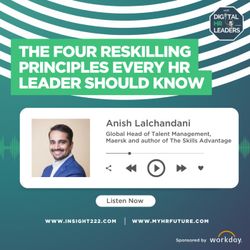
209. The Four Reskilling Principles Every HR Leader Should Know (an Interview with Anish Lalchandani)
33:40||Season 42, Ep. 209With multiple reports predicting the disappearance of millions of jobs in the coming years, an urgent need for a reskilling revolution has sparked organisations and governments across the globe. In this episode of the Digital HR Leaders podcast, host David Green dives into this pressing topic with Anish Lalchandani, Global Head of Talent Management at Maersk and author of The Skills Advantage: A Human-Centered, Sustainable, and Scalable Approach to Reskilling. Packed with insights, this episode covers: The “four cornerstones” of reskilling: awareness, application, agility, and alliances, and how they drive sustainable workforce transformation The pivotal role of AI in accelerating reskilling efforts and the importance of balancing technological advancement with human-centered skills Strategies for building partnerships within and beyond the organisation to foster a supportive reskilling ecosystem Key metrics that HR leaders should use to measure the success of their reskilling initiatives and demonstrate value to the business This episode, sponsored by Workday, is essential for HR leaders looking to transform their people strategies through AI-driven talent orchestration and offers practical takeaways on how to leverage these tools for organisational success. Workday is a leading provider of enterprise cloud applications for HR and finance, recognised as a leader in the Gartner Magic Quadrant for Cloud HCM Suites. Organisations ranging from medium-sized businesses to more than 50% of the Fortune 500— including Netflix, Sanofi, AstraZeneca, and Rolls Royce—have chosen Workday to build their HR systems and implement Workforce Analytics solutions. Join them and learn more at workday.com Links to Resources: Anish Lalchandani on LinkedIn: Anish Lalchandani The Skills Advantage: A Human-Centered, Sustainable, and Scalable Approach to Reskilling Workday: Workday MyHRFuture Academy: MyHRFuture Insight222: Insight222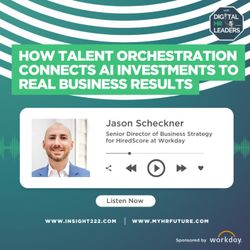
208. How Talent Orchestration Connects AI Investments to Real Business Results (an Interview with Jason Scheckner)
43:52||Season 42, Ep. 208As AI reshapes the HR landscape, many organisations are still grappling with how to turn big investments into real business outcomes. Could talent orchestration be the gap between investment and actionable outcomes? In this episode of the Digital HR Leaders podcast, David Green is joined by Jason Scheckner, Senior Director of Business Strategy for HiredScore at Workday, to reveal how talent orchestration is the key to unlocking AI’s full potential and transforming HR operations into a strategic powerhouse. Packed with actionable insights, this episode delves into: What talent orchestration is and how it builds on the foundation of talent intelligence How it connects various HR systems and data to improve processes beyond traditional methods like data lakes and systems of record Why so many organisations are struggling to make real strides with AI, despite it being a top priority for executives Practical examples of how talent orchestration is enhancing internal mobility and employee retention Key strategies for ensuring AI used in HR remains ethical and safe Metrics and outcomes to gauge the success of talent orchestration efforts This episode, sponsored by Workday, is essential for HR leaders looking to transform their people strategies through AI-driven talent orchestration and offers practical takeaways on how to leverage these tools for organisational success. Workday is a leading provider of enterprise cloud applications for HR and finance, recognised as a leader in the Gartner Magic Quadrant for Cloud HCM Suites. Organisations ranging from medium-sized businesses to more than 50% of the Fortune 500— including Netflix, Sanofi, AstraZeneca, and Rolls Royce—have chosen Workday to build their HR systems and implement Workforce Analytics solutions. Join them and learn more at workday.com Links to Resources: Jason Scheckner on LinkedIn: Jason SchecknerHiredScore: HiredScore Workday: Workday MyHRFuture Academy: MyHRFuture Insight222: Insight222